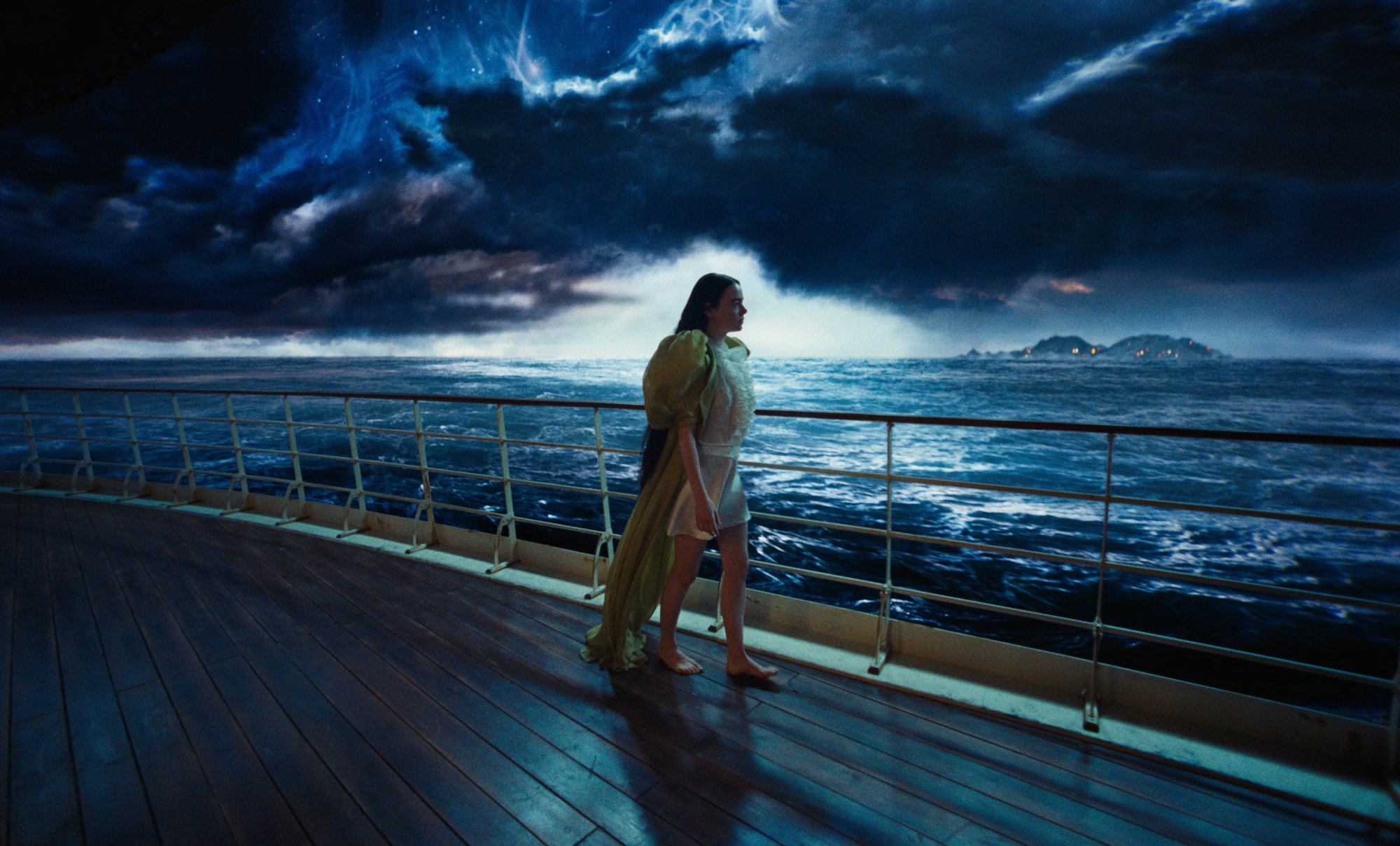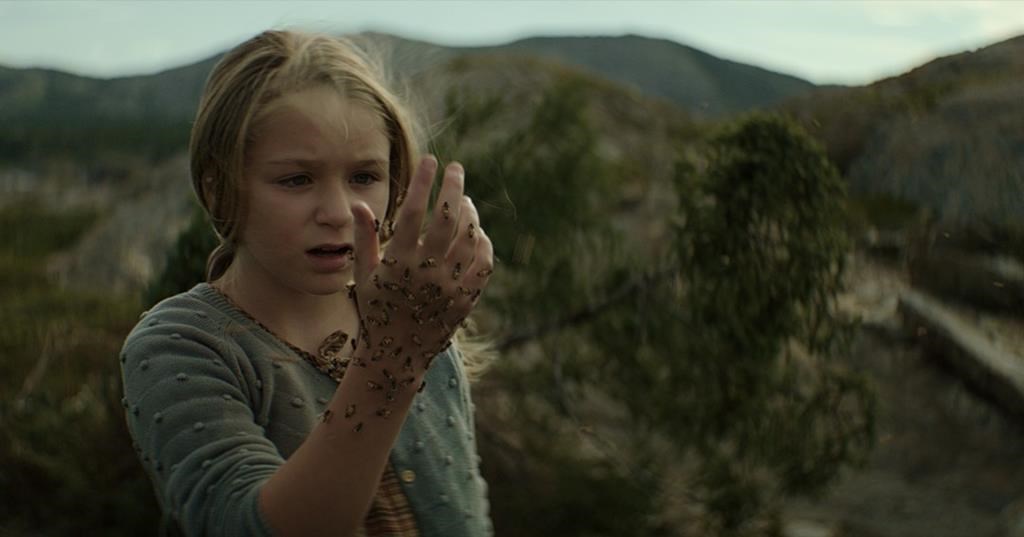Reviews
‘Poor Things’ Review – Yorgos Lanthimos’ Frankenstein-Like Tale Celebrates the Magic of Curiosity

In Yorgos Lanthimos‘ comedic and fantastical Poor Things, an adaptation of Alisdair Gray’s novel, the mad scientist does what Dr. Frankenstein never dared to do: he lets his creation free out into the world instead of seeking to kill it. It’s not fear that drives this decision but love, and it sets the tone for a dazzling, bizarre, and imaginative fairy tale of a journey fueled by curiosity.
The mad scientist here is surgeon Dr. Godwin Baxter (Willem Dafoe), a disfigured medical experiment himself at the hands of a cruel father. His creation is Bella Baxter (Emma Stone), a recently deceased woman he’s revived by replacing her brain with that of her unborn baby, rendering her an infant in a grown woman’s body. Godwin tenderly raises Bella as her young mind develops, enlisting an assistant in medical student Max (Ramy Youssef) to document her early stages of re-life. But Bella is a fast learner with determination and free will. The moment scamp Duncan Wedderburn (Mark Ruffalo) enters Bella’s life, helping along her development mid-sexual awakening, she embarks on a sprawling voyage of discovery and curiosity.

Willem Dafoe in POOR THINGS. Photo by Atsushi Nishijima Courtesy of Searchlight Pictures. © 2023 Searchlight Pictures All Rights Reserved.
Lanthimos, working from the screenplay by Tony McNamara (Cruella, The Favourite), captures the highs and lows and growing pains of Bella’s journey with whimsy and wonder. Robbie Ryan’s cinematography, using a mix of 35mm film stocks, infuses even more personality into the mix. Bella’s sheltered, early development stages are shot in black and white, evoking The Wizard of Oz as flashbacks and Bella’s life outside the Baxter household switch to a vibrant jewel-toned color palette. The palette almost imperceptibly changes as Bella herself is changed by her evolution, shaped by life experiences. Wide angle, fish-eye lens gets employed to great effect, a means of both conveying the strangeness of discovery and scale. Holly Waddington’s costume design also matches Bella’s evolution to an awe-inspiring degree, telling a story in and of itself.
Much like her character, there’s a fearlessness to Emma Stone’s performance. Bella is driven almost solely by curiosity and a deep fascination with the world. Stone handles it all with a nuanced frankness, whether she’s exploring Bella’s clumsy, heavy-footed toddler behavior or finding liberation through sex, with zero concerns about taboos or impoliteness. Bella begins as a blank slate, eager to be shaped by the world around her. She doesn’t know cynicism until she feels the sting of it. She didn’t understand fear until she learned of it. It’s Stone’s comedic and blunt portrayal of Bella that makes Poor Things such a profoundly human experience.

Photo by Atsushi Nishijima Courtesy of Searchlight Pictures. © 2023 Searchlight Pictures All Rights Reserved.
Employing simple, old school techniques that include miniatures and ethereal painted backdrops, Poor Things celebrates a world made richer by curiosity. Lanthimos, through exquisite style and form, all but asks his audience to recall a golden era of cinema driven and shaped by audience curiosity. It’s a beguiling reminder that curiosity enriches us, even when it leads to painful encounters and harsh lessons. Above all, it highlights how an expanded worldview deepens empathy. For a story that draws from Frankenstein, birthing an inverse fairy tale world that shows what kindness might have afforded Dr. Frankenstein’s creation, there’s perhaps no more fitting theme than that.
Poor Things’ dedication to bluntly exploring the weirdest quirks of humanity, from infancy to adulthood, is the precise type of strange cinema that mainstream audiences will find off-putting. Yet through Stone’s audacious performance and Lanthimos’ awe-inducing approach, Poor Things fearlessly and humorously champions the magic of curiosity that’ll reward adventurous movie lovers.
Poor Things releases in select theaters on December 8, followed by wide release on December 22, 2023.


Reviews
‘The King Tide’: An Island Town Rots with Moral Decay in Canadian Folk Horror Fable [Review]

The opening scenes of director Christian Sparkes’ The King Tide set an ominous tone: a powerful storm takes down the power lines of a small island town as a pregnant woman loses her child while her dementia-suffering mother sits nearby. In the morning, as the town takes stock of the damage and the power is restored, a surprising discovery is found in an overturned boat in the harbour: a baby girl…with the ability to heal.
Writers Albert Shin and William Woods, working from a story by Kevin Coughlin and Ryan Grassby, treat the story as something of a morality tale mixed with a fable. Following the cold open, the action jumps ahead 10 years at a point when the unnamed island (the film was shot in Newfoundland, Canada) is thriving. The fishing is bountiful, the islanders are self-sufficient and have cut ties with the mainland, and most everyone is happy.
As characters are prone to saying, it’s all thanks to Isla (Alix West Lefler), the miracle baby who has grown up worshipped by the islanders. While Mayor Bobby Bentham (Clayne Crawford) and his wife Grace (Lara Jean Chorostecki) endeavor to raise Isla like any other little girl, the reality is that the island’s entire ecosystem revolves around her miraculous powers. It is only because of Isla that they survive; every aspect of their lives – from medicine to food – relies on her.
Each day the citizens line up for their allotted time with the young girl – be it to stave off breast cancer, like Charlotte (Kathryn Greenwood), or recover from another night of heavy drinking like former doctor, Beau (Aden Young). There’s even a predetermined schedule for when she will go out on the boats and use her power to lure fish into the nets.

One fateful day, Bobby succumbs to peer pressure and alters Isla’s schedule at the last minute to accompany cod fishermen Marlon (Michael Greyeyes) and Dillon (Ryan McDonald). A childish game with fatal consequences is played, but with Isla indisposed, a young boy, who would have otherwise been fine, dies. And while the rest of the community grieves, it is Isla who is completely shaken and, unexpectedly, loses her powers.
Suddenly the entire balance of the island is thrown off. Folks like Grace’s mother, Faye (Frances Fisher), who relied on Isla to keep her dementia at bay, suddenly reckon with mortality, while the food security of the town is called into question. Faye’s late-night “support group” meetings take on an urgent and secretive tone and the townspeople claim ownership of Isla’s time despite Bobby and Beau’s protests that she needs rest to recover from her trauma.
Like the best thrillers, the politics and personalities within the community come into play as morals are compromised and the good of individuals vs the collective is played out in increasingly desperate situations. The King Tide excels because it is interested in exploring the competing motivations of the townspeople, while also resolutely refusing to paint anyone as inherently good or bad. These are desperate people, determined to remain independent and free from outside interference, while protecting their trapped-in-amber way of life.

These developments work because there’s a humanity to the characters and The King Tide wisely relies heavily on its deep bench castoff character actors to drive the conflict. Crawford is the de facto protagonist of the ensemble and he’s also the most straightforward character: Bobby is a good man and a loving father, but he’s no white knight. At several points in the film, his willingness to acquiesce to the demands of the community and retain his power causes events to spiral further out of control.
Even more fascinating are Grace and Faye, two commanding women whose capacity for maternal love is matched – or eclipsed – by their own self-interests. A mid-film discovery about Isla’s power reframes Grace’s priorities, ultimately pitting her against her husband. As a result, Grace is incredibly compelling and frustrating (in a good way) and Chorostecki, who has done great genre work on both Hannibal to Chucky, plays the moral ambiguity exactly right. Grace is a fascinating and flawed human character in a film filled with them.
The same goes for Fisher, who deftly balances Faye’s grandmotherly love for Isla with the needs of the community and, by extension, her own health demands. In the hands of a lesser performer, it would be easy to hate Faye for her actions, but Fisher’s performance perfectly captures the fierce determination and fear that drives the island’s matriarch.
Finally, there’s Aden Young, The King Tide’s secret weapon. The ten-year jump reveals that Beau has undergone the most significant transformation: while everyone else has benefitted from Isla’s powers, her presence has eliminated the need for a doctor. With the clinic effectively shuttered, Beau has become an alcoholic; a shell of his former self with no purpose.
Like Bobby, Beau is the easiest character to root for because of his selfless desire to protect Isla, but Young (renowned for his work with Crawford on Rectify) unlocks the character’s tragic pathos and, in the process, becomes the film’s emotional anchor.

Framing the moral decline of the islanders and anticipating the unexpectedly devastating climax is the natural beauty of Newfoundland. As shot by cinematographer Mike McLaughlin, there’s a steely beauty to the geography, resplendent with rocky cliffs, pounding surf, and gusty bluffs that reinforce the islanders’ isolation.
There’s a fierce pride in their struggle to survive independently, evident in the simple lodgings and the antiquated alarm bell that is rung whenever fishing ships from the mainland stray too close. It’s a chilly, atmospheric calling card for one of the most picturesque provinces in Canada, but it is a perfect complement for the folk horror narrative.
Armed with serene, beautiful cinematography, murky moral developments, and a deep bench of talented character actors, The King Tide is a quiet gem that demands to be seen. It’s one of the year’s best genre films.
The King Tide is in theaters April 26, 2024.














You must be logged in to post a comment.